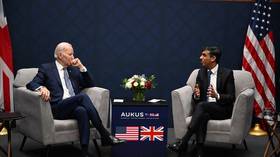Argentina has submitted a formal request to the US-led military bloc for ‘global partner’ status, Defense Minister Luis Petri says
© X / @luispetri
Argentina has officially asked NATO to accept it as a new “global partner,” the country’s Defense Minister Luis Petri announced on Thursday following a meeting with the US-led military bloc’s Deputy Secretary General Mircea Geoana.
In a post on X, Petri shared pictures from his meeting with Geoana in Buenos Aires, and said that he “presented the letter of intent that expresses Argentina’s request to become a global partner” of NATO. He vowed to “continue working to recover links that allow us to modernize and train our forces to NATO standards.”
The US has already designated Argentina as a Major non-NATO Ally (MNNA); Washington uses this term to classify countries that have strategic relationships with the US Armed Forces but do not formally belong to the NATO bloc.
The Global Partner, or ‘Partners Across the Globe’, designation signifies even deeper ties with the US-led group, such as sharing intelligence and participating in joint military operations, and is currently held by countries such as Australia, Japan, South Korea, Colombia, Iraq, Mongolia, New Zealand and Pakistan.

Read more
Petri’s statement comes as Argentina’s President Javier Milei, who was elected last December, has launched a wave of radical reforms aimed at stabilizing the country’s ailing economy and has sought to establish closer ties with the US and other Western countries, even looking to peg its national currency to the dollar.
After securing the presidency, Milei, a self-described ‘anarcho-capitalist’, also formally rejected an invitation to become a member of the BRICS group of nations, led by Russia, China, India, Brazil and South Africa, claiming that he would not “align with the communists.”
Instead, the Argentinian president has insisted that the best way to protect his country’s sovereignty is to strengthen its “strategic alliance” with Washington and other countries that “embrace the causes of freedom.”




